IU MFA student Christine Wang explored the theme of "Remembering and Forgetting." An interview with her is below.
What was the inspiration behind your work?
Christine: Nietzsche teaches us that forgiveness is an ability bestowed to us by heaven. People invoke the power of forgetting as a form of escapism, to break away from the crippling burdens placed upon us by things like self, time and more. We use it to shed off the shackles placed upon us by our self-imposed ideologies and rationales. In the same way, we also use it to realize our visions of happiness, understanding, and aesthetic freedom.
Personally, I agree that while the act of forgetting may create a greater opportunity to forge new memories, the act of willful forgetting should be approached with heavy caution and restraint. Memories are a great source of personal identity. They are analogous to the quantum world that lays just beyond our vision. At any moment in time, it can sprout forth as a vivid fountain of color or a darker blanket of nothingness. For all the pain and sorrow that these memories may bring, they work to define us just as much as we try to define them. There is triumph to be gained from grief, and lessons to be learned from failure. I believe we must embrace both the pain and the joy that are brought to us by memories, as they are what give us our individuality. Their duality is what brings balance to our lives, and defines our character.
Caterpillars have always been the perfect metaphor when talking about metamorphosis. The ugly and oftentimes despised caterpillar walls itself up in a cocoon, only to emerge later after its transcendence into a beautiful butterfly has been complete. However, studies seem to indicate that butterflies seem to retain no memory of their pre-cocoon lives, but what if they could? To me, the caterpillar/butterfly dynamic isn’t just about beauty vs. beast, it’s about the balance between ours the memories we have with us, and the ones we’ve left behind.



 The College of Arts
The College of Arts